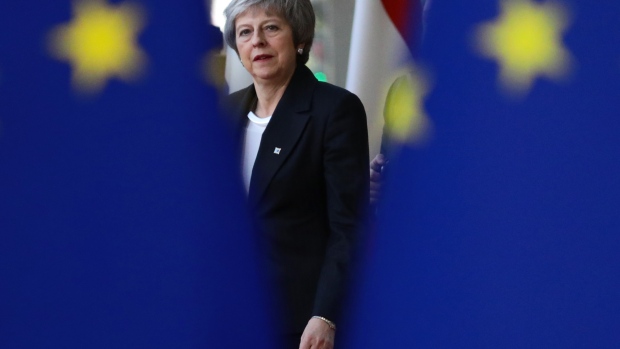Jan 7, 2019
Theresa May steps up no-deal plans as Parliament returns
, Bloomberg News

Parliament returns with just 12 weeks to go until Britain leaves the European Union, and Prime Minister Theresa May faces a major battle to secure politicians’ backing for her Brexit deal.
Key Developments:
May sets up Cabinet committee to prepare for no-deal Brexit Date for parliamentary vote on her deal will be decided on Wednesday U.K. still seeking "assurances" from EU on the most toxic part of the agreement Germany and Ireland step up talks on Brexit solution
May Talks Up the Brexit Dividend (12:50 p.m.)
May has been in Liverpool, trying to talk about something other than Brexit. The plan for how the National Health Service copes with the pressures of an aging population and increased treatment costs probably matters more to voters than Brexit, but it was impossible to change the subject for long. May said in her speech that leaving the EU means more money is available for the NHS.
This is not what her officials tell her: the forecasts are for economic growth to slow after Brexit, meaning there will be less money to go round. But the prime minister stuck to her guns.
It highlighted again the difficulty she faces with Brexit: May’s Conservative Party doesn’t like to hear that things might get worse on leaving the EU, so she can’t say so, even if that’s what she’s being told.
On the question of whether she’ll get her deal through Parliament, she repeated that she’s looking for “further assurances” from the EU to deal with her party’s concerns.
A U.K. official said earlier that she wants a guarantee on when the post-Brexit trade deal will come into effect. The idea is to reduce the likelihood of the so-called Irish backstop ever being used. The government is also considering giving Parliament more power over the backstop -- the widely loathed part of the divorce deal that aims to prevent a hard border emerging on the island of Ireland.
EU: ‘Closely’ Watching U.K. Developments (11:55 a.m.)
There’s little sign the European Union is preparing to offer May anything substantial to help her sell the agreement to Parliament.
“The deal that is on the table is the best and the only deal possible,” European Commission spokesman Margaritis Schinas said in Brussels, adding that the bloc is “closely” watching Brexit developments in the U.K. Commission President Jean-Claude Juncker plans to speak to May again this week.
“This deal will not be renegotiated,” Schinas said.
New Committee for No-Deal Preparations (11:50 a.m.)
May is setting up a new Cabinet committee of 21 ministers focused on no-deal planning to be chaired by the prime minister, her spokesman James Slack told reporters in London. Its remit will be contingency plans as well as “engagement” with the EU on no-deal planning.
Meanwhile the date for the parliamentary vote on May’s Brexit deal will be set on Wednesday via a business motion in Parliament, Slack said. May herself has said it will be around Jan. 15.
Slack also updated reporters on May’s calls with EU leaders over the Christmas break. She spoke to German Chancellor Angela Merkel, French President Emmanuel Macron and Spanish Prime Minister Pedro Sanchez over the holiday, as well as the EU’s Jean-Claude Juncker and Donald Tusk. The aim is to get get assurances that the so-called Irish backstop won’t go on indefinitely, he said.
Slack was also asked if Parliament will have to work through weekends and holidays to get Brexit legislation passed in time for exit day on March 29. “We will do whatever is required to deliver that,” he replied.
German-Irish Brexit Talks Intensify (11:10 a.m.)
Germany’s Foreign Minister Heiko Maas will travel to Dublin on Tuesday to address a gathering of Irish diplomats, returning an earlier visit by his Irish counterpart, Simon Coveney. It’s the latest intensification of German-Irish contacts as Westminster prepares to vote on British Prime Minister Theresa May’s Brexit deal next week.
Irish Prime Minister Leo Varadkar and German Chancellor Angela Merkel spoke for 40 minutes by phone on Thursday at the German leader’s request. A day later, Varadkar addressed members of Bavaria’s ruling Christian Social Union party, and told reporters afterward he shares with Merkel a “strong desire” to aid May as she faces defeat in next week’s vote. He added the caveat, though, that they’d do what they could “within reason.”
Earlier:
U.K. Lawmakers Ratchet Up Campaign to Avert No-Deal Brexit Pound Fortunes to Be Set by Brexit Talks as Parliament Returns Brexit Catchup: What You Missed Over the Christmas Break






